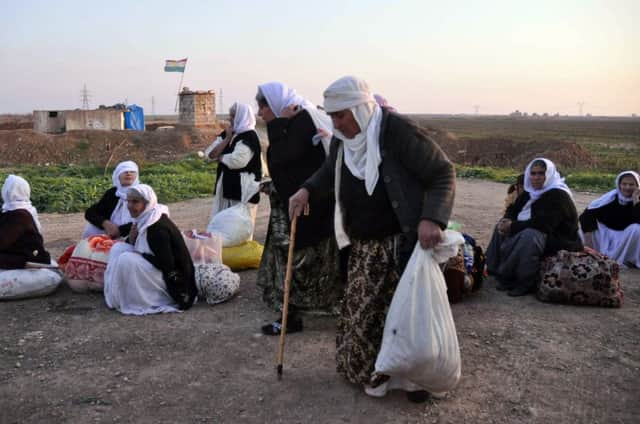‘Abused and mentally damaged’ – 200 Yazidis freed by IS


The captives were mostly elderly and infirm and probably slowed the extremists down, Kurdish military officials said yesterday.
Almost all the freed prisoners were in poor health and bore signs of abuse and neglect. Three were young children. The former captives were being questioned and receiving medical treatment yesterday in the town of Alton Kupri.
Advertisement
Hide AdAdvertisement
Hide AdGeneral Shirko Fatih, commander of Kurdish peshmerga forces in the northern Iraqi city of Kirkuk, said it appears the militants released the prisoners because they were too much of a burden.
“It probably became too expensive to feed them and care for them,” he said.
Tens of thousands of Yazidis fled in August when the IS group captured the northern Iraqi town of Sinjar, near the Syrian border. Hundreds were taken captive, with some Yazidi women forced into slavery, according to international rights groups and Iraqi officials.
The militants transported the mainly elderly captives from the northern town of Tal Afar and left them at the Khazer Bridge, near the Kurdish regional capital of Irbil.
“Their situation is very bad, especially the psychological condition,” said an official. “Regarding other diseases, we provide first aid and the most important medical treatment.”
Khodr Domli, a Yazidi rights activist, said. “Some are wounded, some have disabilities and many are suffering from mental and psychological problems.”
One elderly Yazidi among those released said some of them feared they would be executed when the militants ordered them on to buses.
One of them, an elderly Yazidi man in a wheelchair, said they had spent months in captivity.
Advertisement
Hide AdAdvertisement
Hide AdHe added: “It was so hard, not only because of the lack of food but also because I spent so much time worrying.”
Maha Faris Qassem, 35, was released with her two young sons, both of whom were covered from head to toe in insect bites which appeared to be infected. She said the conditions of their captivity were so appalling that infection was inevitable.
About 50,000 Yazidis – half of them children, according to UN figures – fled to the mountains outside Sinjar during the onslaught. Some remain there. The US launched airstrikes and humanitarian aid drops in Iraq on 8 August, partly in response to the crisis on Sinjar Mountain.
Since then, a coalition of eight countries have conducted more than 1,000 airstrikes across Iraq in an effort to eradicate the IS group, which now holds a third of both Iraq and Syria.
The Sunni militant group views Yazidis and Shiite Muslims as apostates, and has demanded Christians either convert to Islam or pay a special tax.
“I don’t know the details of why they released us,” Gawre Semo, 69, said yesterday. “They are very bad people. They took our children.”